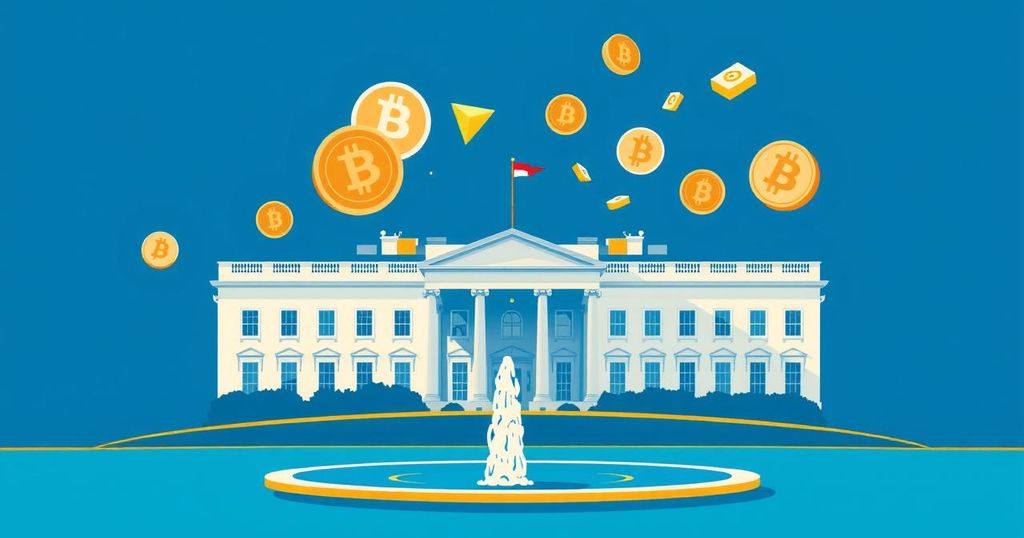Impact of Geofencing Policies on U.S. Crypto Users and Tax Revenue
U.S. crypto users have lost an estimated $5 billion in airdrops due to geofencing policies prompted by regulatory uncertainties. This has led the government to miss out on $1.4 billion in tax revenue. Lawmakers are seeking clarity from the SEC regarding airdrop classifications, while industry leaders advocate for structured regulations to facilitate compliance and protect users’ rights. Currently, geofencing practices inhibit U.S. investors from participating in opportunities available elsewhere.
Over the last four years, U.S. crypto users have potentially forfeited $5 billion in airdrops due to geofencing policies enacted by cryptocurrency projects. These policies arise from regulatory uncertainties and enforcement actions by the SEC, restricting participations in significant airdrops for millions of U.S. users. The concerns centre on the classification of airdropped tokens as securities amidst ongoing legal debates.
The financial repercussions extend to the U.S. government, which has lost an estimated $1.4 billion in tax revenues between 2020 and 2024. This loss stems from two primary sources: personal income tax on received airdrops and corporate taxes that would have arisen from crypto businesses operating inside the U.S. instead of relocating offshore.
A noteworthy instance is Tether, which reported profits of $6.2 billion in 2024 but imposed zero U.S. corporate taxes due to its offshore status. Under full U.S. taxation, Tether could have accounted for approximately $1.3 billion in federal taxes alongside $316 million in state taxes, reflecting the significant impact of offshore operations.
Regulatory ambiguity has contributed to a trend of blockchain startups leaving the United States. In 2024 alone, the SEC undertook 33 enforcement actions against crypto firms, with 73% involving claims of fraud and 58% concerning unregistered securities offerings. Such actions have hindered innovation, with numerous projects opting to avoid the U.S. market.
Lawmakers are paying attention to the regulatory difficulties affecting airdrops. In September 2024, Representatives Patrick McHenry and Tom Emmer addressed SEC Chair Gary Gensler in a letter seeking clarification on airdrops’ classification as securities. Their correspondence highlighted inconsistencies in the SEC’s regulatory stance, especially when contrasted with traditional reward systems like airline miles or credit card point programs.
Geofencing, which entails blocking users based on geographical locations, has become the standard risk management approach for crypto projects in an era of regulatory ambiguity. Unfortunately, it is often implemented ineffectively, leading to undue exclusion of compliant market users. The reluctance to operate in the U.S. stems more from fear than necessity, culminating in missed opportunities for both investors and tax income.
Advocates of a more structured compliance framework argue that it would enable crypto projects to serve U.S. users while adhering to the requisite regulations. Prominent industry participants, like A16z Crypto, have also urged regulatory reform by advocating for the SEC to provide formal guidance on airdrops and define clear exemptions for token distributions not intended for fundraising.
Additionally, suggested reforms proposed by Scott Walker and Bill Hinman emphasise the establishment of eligibility criteria that exempt airdrops from being labelled as securities. They advocate aligning airdrop regulations with those of consumer reward schemes for greater consistency, as well as introducing safe harbour provisions to shield projects distributing tokens to their communities.
Currently, crypto projects remain hesitant to incorporate U.S. investors in their airdrops, leading to ongoing missed opportunities for American users compared to their international counterparts. If the SEC were to implement clearer guidelines, it could alleviate these uncertainties, permitting U.S. investors to engage in airdrops without facing legal challenges, which would ultimately benefit individuals and the broader economy.




Post Comment